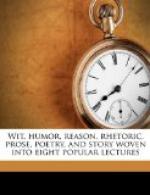Someone has said the nearest spot to heaven in this world is a happy home, where the parents are young and the children small. I don’t know about that. It seems to me a little nearer heaven is the home where husband and wife have lived long together, where children honor parents and parents honor God; where the aged wife can look her husband in the face and give him the sentiment of the dame of John Anderson:
“John Anderson, my jo John,
When we were first acquent;
Your locks were like the raven,
Your bonnie brow was brent;
But now your brow is beld, John,
Your locks are like the snaw;
But blessings on your frosty pow,
John Anderson, my jo.
“John Anderson, my jo, John,
We clamb the hill thegither;
And mony a cantie day, John,
We’ve had wi’
one anither:
Now we maun totter down, John,
And hand in hand we’ll
go,
And sleep thegither at the foot,
John Anderson, my jo.”
James A. Garfield said: “It’s by the fireside, where calm thoughts inspired by love of home and love of country, the history of the past, the hope of the future, God works out the destiny of this republic.”
A Spartan general pointing to his army said: “There stand the walls of Sparta and every man’s a brick.” Can I not point to the homes of our country and say: “There stand the walls of this republic and every home’s a brick.” Suppose a battery, planted on some eminence outside this city, were to send a shell through some building every hour; how long until your beautiful city would be one of crumbling walls and flying population? On yonder heights of law are planted two hundred thousand rum batteries, sending shells of destruction through the homes of the people and every day hundreds of homes are knocked out of the walls of the republic.
Do you realize what it means when an American home is destroyed by drink? Some years ago on Sunday afternoon I visited an eastern penitentiary by invitation of the chaplain. Passing a row of cells my attention was called to a man whose face bore the marks of intelligence and refinement. The chaplain said: “That man is an ideal prisoner and a born gentleman, though here for life. He is the graduate of an eastern college. He married an accomplished young woman. In social life he was led into the drink habit, and it grew upon him until at times he became intoxicated. When under the influence of liquor his reason was dethroned, and one night in a brawl he killed a man. He was given a life sentence. Asking permission to speak he said: ’I have no complaint to make of the verdict, but beg the privilege of saying, God who knows the secrets of all hearts, knows I am not a murderer at heart, for I don’t know how nor when I killed my friend.’ A few days after he entered this prison his wife came to visit him. She had with her a sweet little golden-haired child. As he entered the office in his striped




